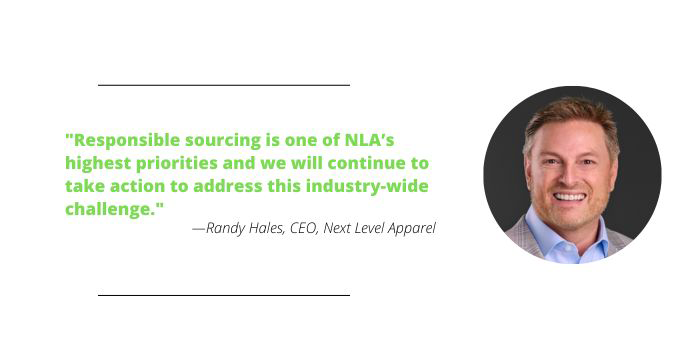Some inventoried fabrics from industry supplier Next Level Apparel (PPAI 272027, S3) have been shown to contain cotton originating in the Xinjiang region of China.
In recent months, the Los Angeles-based company has taken several steps to bring its sourcing closer to the U.S. and under greater scrutiny.
At Issue
Independent testing conducted on behalf of clothing brand Nine Line Apparel identified material in some Next Level Apparel T-shirts as being of Xinjiang origin. The Uyghur Forced Labor Prevention Act, signed into law in December 2021, bans all imports from China’s Xinjiang province under the presumption that all goods from the area are produced with forced labor.
“When Nine Line raised concerns, we took timely action to address them and protect the integrity of our products,” Next Level Apparel CEO Randy Hales tells PPAI Media. “We offered the company the opportunity to return its inventory and subsequently quarantined it. We conducted our own testing, discovered a very small amount of our fabric inventory tested positive and quarantined that inventory. We have also terminated our relationship with the supplier in question.
“This is an industry-wide challenge – and NLA continues to take action to help ensure our partners and their products align with our strong commitment to responsible sourcing.”
Sourcing Today
Many companies in the promotional merchandise market are reconsidering sourcing their goods from China. At the 2022 PPAI Product Responsibility Summit, more than 80% of compliance professionals in attendance signaled that they were looking to move production out of the country.

This year, Next Level Apparel has made several moves to bring its sourcing closer to home. It has transitioned all incoming fabric to 100% U.S. grown cotton, as well as initiated a partnership with Oritain to provide origin verification for its worldwide cotton program, and with GK Global and Grupo M to strengthen nearshore production accessibility.
“Responsible sourcing is one of NLA’s highest priorities and we will continue to take action to address this industry-wide challenge,” Hales says. “As company policy, we require all global fabric vendors to use 100% U.S. grown cotton for fabric purchase orders and, in partnership with Oritain, have implemented a robust testing program for additional verification.
“All our suppliers are required to sign affidavits to guarantee the fabrics they provide come from untainted sources, to continually update their sourcing information, and to undergo onsite inspections. We have also pursued partnerships to nearshore much of our fabric production in Latin America.”
China and the sourcing challenges are an ongoing topic of concern and discussion in the promotional products industry. The issue will again be part of the discussion at the 2023 PPAI Product Responsibility Summit.


